Business Law: Analyzing Legal Systems and Solutions for Businesses
VerifiedAdded on 2024/06/11
|23
|4870
|199
Report
AI Summary
This report provides a comprehensive overview of the English legal system and its impact on businesses. It begins by explaining the sources of law, including legislation, common law, and EU laws, and highlights key laws applicable to organizations, such as the Companies Act 2006, Finance Act, Health and Safety at Work etc. Act 1974, and Contracts (Applicable Law) Act 1990. The report then delves into the role of the government in law-making and how statutory and common law are applied in justice courts. It evaluates the effectiveness of the legal system, illustrating the potential impact of company, employment, and contract law on businesses with specific examples, including health and safety regulations, equal opportunities regulations, and the General Data Protection Regulation (GDPR). Furthermore, the report differentiates and analyzes the potential impacts of regulations, legislation, and standards, providing a critical evaluation of the legal system and law. Finally, the report suggests appropriate legal solutions for various business problems, assesses the positive and negative impacts of these solutions, and recommends legal solutions based on alternative legal advice, comparing their effectiveness. The analysis provided is intended to give businesses a better grasp of their legal obligations and possible remedies.
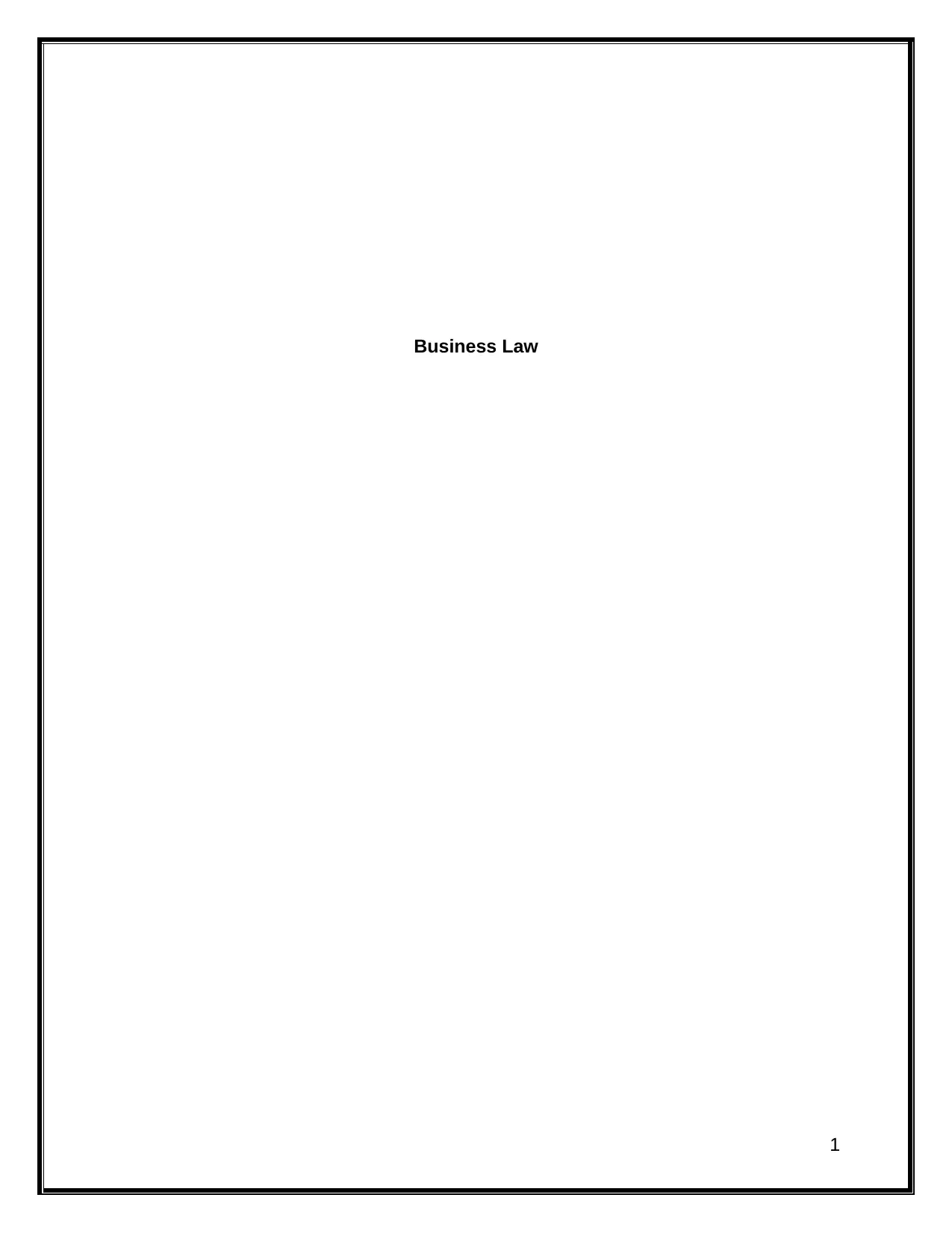
Business Law
1
1
Paraphrase This Document
Need a fresh take? Get an instant paraphrase of this document with our AI Paraphraser
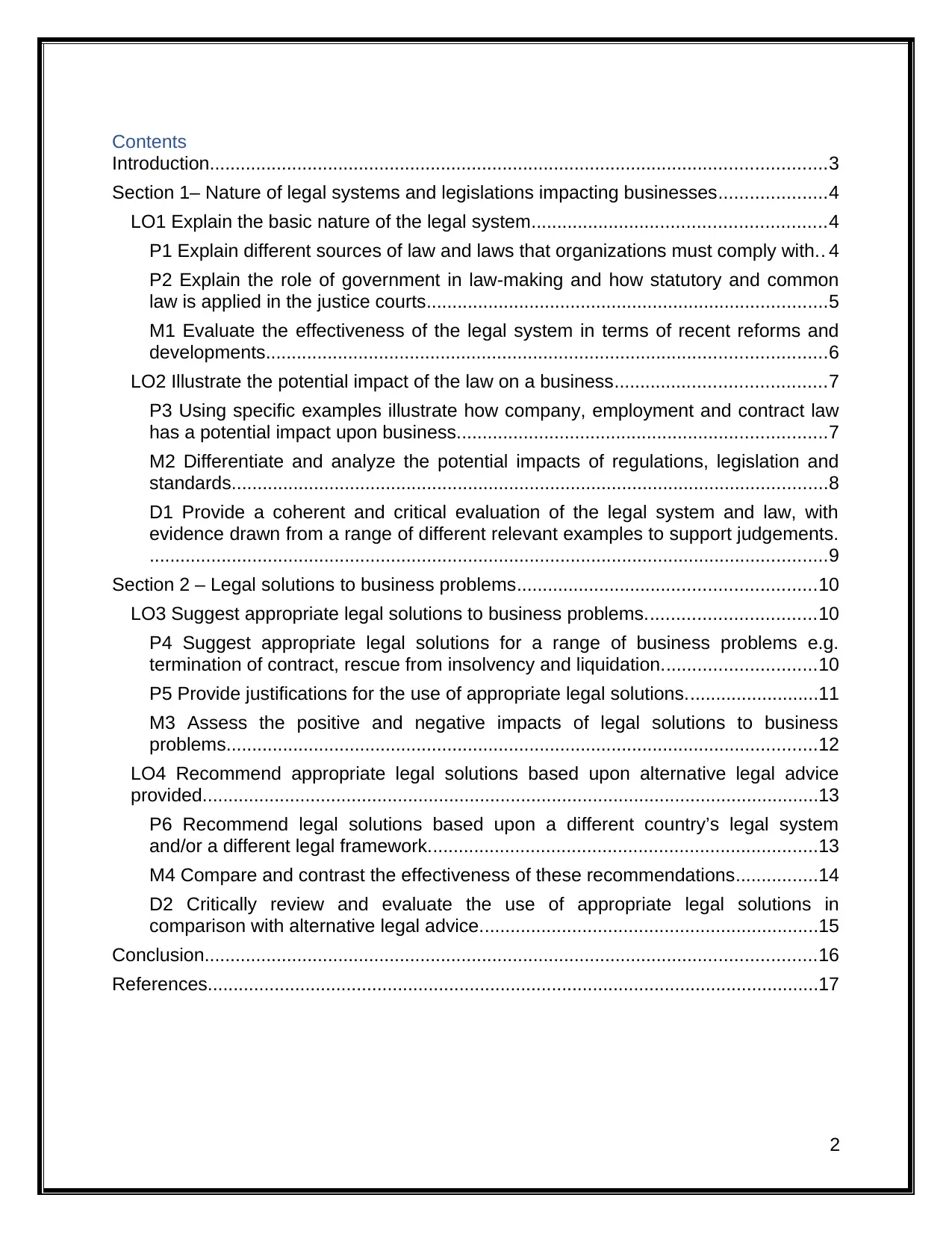
Contents
Introduction........................................................................................................................3
Section 1– Nature of legal systems and legislations impacting businesses.....................4
LO1 Explain the basic nature of the legal system.........................................................4
P1 Explain different sources of law and laws that organizations must comply with.. 4
P2 Explain the role of government in law-making and how statutory and common
law is applied in the justice courts..............................................................................5
M1 Evaluate the effectiveness of the legal system in terms of recent reforms and
developments.............................................................................................................6
LO2 Illustrate the potential impact of the law on a business.........................................7
P3 Using specific examples illustrate how company, employment and contract law
has a potential impact upon business........................................................................7
M2 Differentiate and analyze the potential impacts of regulations, legislation and
standards....................................................................................................................8
D1 Provide a coherent and critical evaluation of the legal system and law, with
evidence drawn from a range of different relevant examples to support judgements.
....................................................................................................................................9
Section 2 – Legal solutions to business problems..........................................................10
LO3 Suggest appropriate legal solutions to business problems.................................10
P4 Suggest appropriate legal solutions for a range of business problems e.g.
termination of contract, rescue from insolvency and liquidation..............................10
P5 Provide justifications for the use of appropriate legal solutions..........................11
M3 Assess the positive and negative impacts of legal solutions to business
problems...................................................................................................................12
LO4 Recommend appropriate legal solutions based upon alternative legal advice
provided........................................................................................................................13
P6 Recommend legal solutions based upon a different country’s legal system
and/or a different legal framework............................................................................13
M4 Compare and contrast the effectiveness of these recommendations................14
D2 Critically review and evaluate the use of appropriate legal solutions in
comparison with alternative legal advice..................................................................15
Conclusion.......................................................................................................................16
References.......................................................................................................................17
2
Introduction........................................................................................................................3
Section 1– Nature of legal systems and legislations impacting businesses.....................4
LO1 Explain the basic nature of the legal system.........................................................4
P1 Explain different sources of law and laws that organizations must comply with.. 4
P2 Explain the role of government in law-making and how statutory and common
law is applied in the justice courts..............................................................................5
M1 Evaluate the effectiveness of the legal system in terms of recent reforms and
developments.............................................................................................................6
LO2 Illustrate the potential impact of the law on a business.........................................7
P3 Using specific examples illustrate how company, employment and contract law
has a potential impact upon business........................................................................7
M2 Differentiate and analyze the potential impacts of regulations, legislation and
standards....................................................................................................................8
D1 Provide a coherent and critical evaluation of the legal system and law, with
evidence drawn from a range of different relevant examples to support judgements.
....................................................................................................................................9
Section 2 – Legal solutions to business problems..........................................................10
LO3 Suggest appropriate legal solutions to business problems.................................10
P4 Suggest appropriate legal solutions for a range of business problems e.g.
termination of contract, rescue from insolvency and liquidation..............................10
P5 Provide justifications for the use of appropriate legal solutions..........................11
M3 Assess the positive and negative impacts of legal solutions to business
problems...................................................................................................................12
LO4 Recommend appropriate legal solutions based upon alternative legal advice
provided........................................................................................................................13
P6 Recommend legal solutions based upon a different country’s legal system
and/or a different legal framework............................................................................13
M4 Compare and contrast the effectiveness of these recommendations................14
D2 Critically review and evaluate the use of appropriate legal solutions in
comparison with alternative legal advice..................................................................15
Conclusion.......................................................................................................................16
References.......................................................................................................................17
2
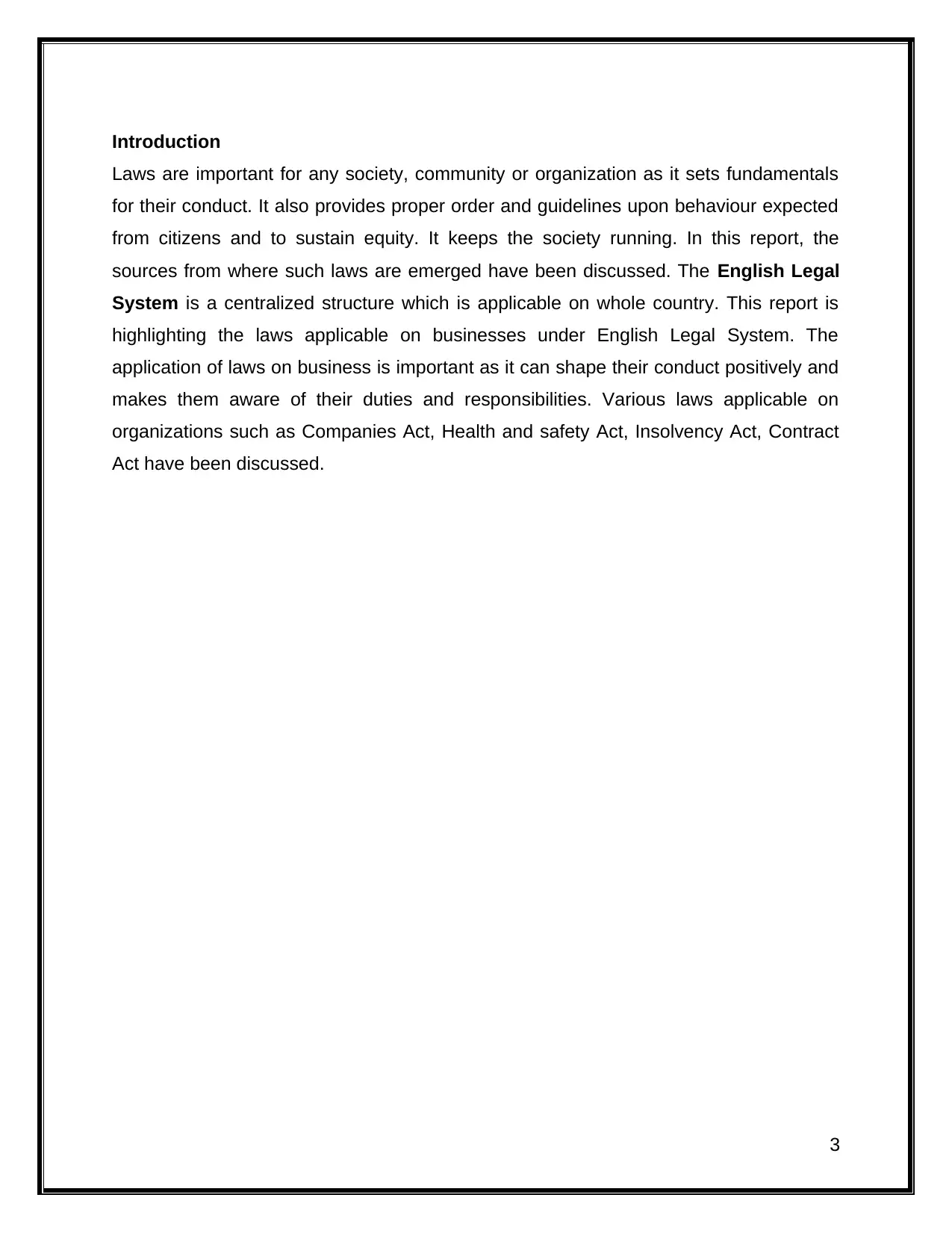
Introduction
Laws are important for any society, community or organization as it sets fundamentals
for their conduct. It also provides proper order and guidelines upon behaviour expected
from citizens and to sustain equity. It keeps the society running. In this report, the
sources from where such laws are emerged have been discussed. The English Legal
System is a centralized structure which is applicable on whole country. This report is
highlighting the laws applicable on businesses under English Legal System. The
application of laws on business is important as it can shape their conduct positively and
makes them aware of their duties and responsibilities. Various laws applicable on
organizations such as Companies Act, Health and safety Act, Insolvency Act, Contract
Act have been discussed.
3
Laws are important for any society, community or organization as it sets fundamentals
for their conduct. It also provides proper order and guidelines upon behaviour expected
from citizens and to sustain equity. It keeps the society running. In this report, the
sources from where such laws are emerged have been discussed. The English Legal
System is a centralized structure which is applicable on whole country. This report is
highlighting the laws applicable on businesses under English Legal System. The
application of laws on business is important as it can shape their conduct positively and
makes them aware of their duties and responsibilities. Various laws applicable on
organizations such as Companies Act, Health and safety Act, Insolvency Act, Contract
Act have been discussed.
3
⊘ This is a preview!⊘
Do you want full access?
Subscribe today to unlock all pages.

Trusted by 1+ million students worldwide
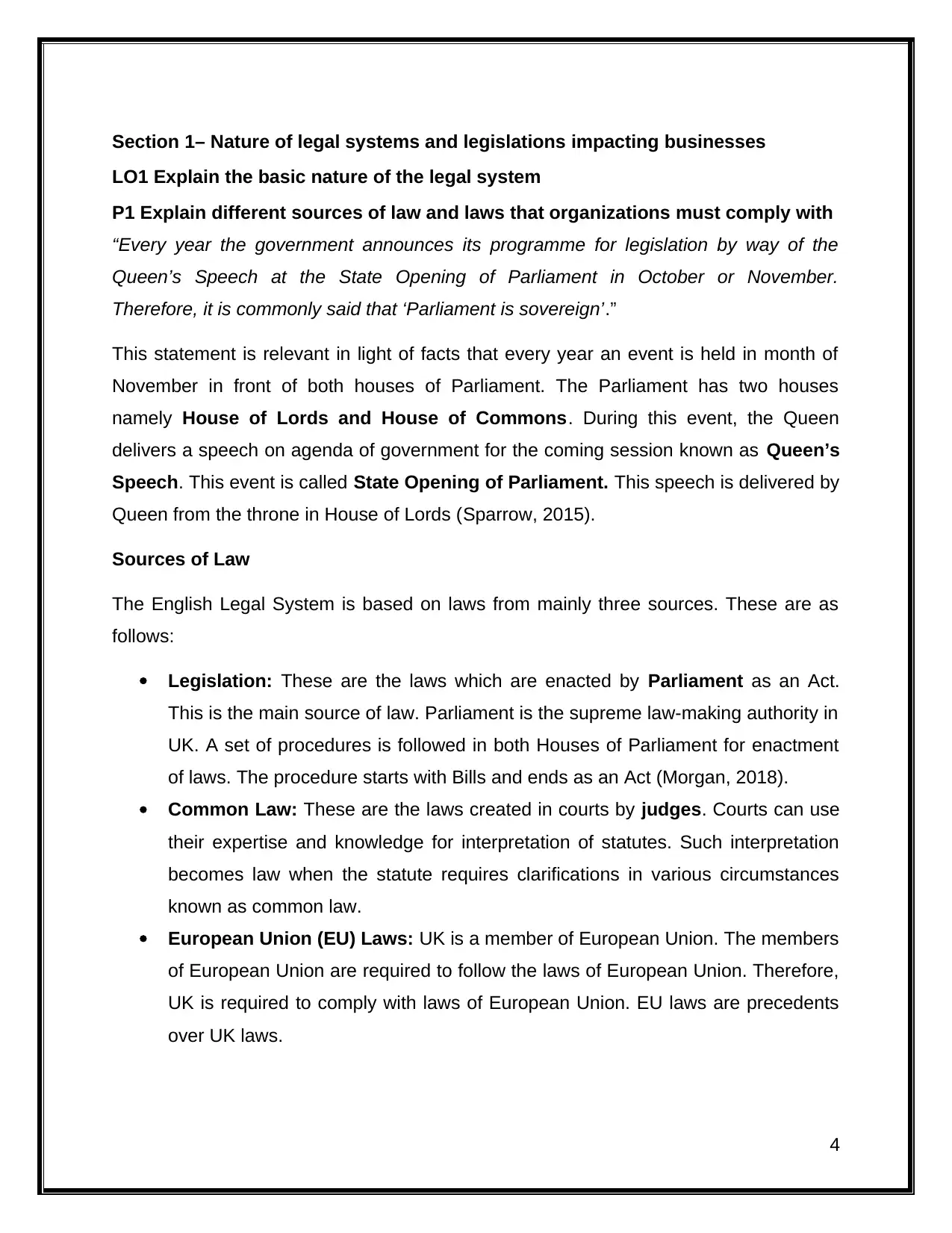
Section 1– Nature of legal systems and legislations impacting businesses
LO1 Explain the basic nature of the legal system
P1 Explain different sources of law and laws that organizations must comply with
“Every year the government announces its programme for legislation by way of the
Queen’s Speech at the State Opening of Parliament in October or November.
Therefore, it is commonly said that ‘Parliament is sovereign’.”
This statement is relevant in light of facts that every year an event is held in month of
November in front of both houses of Parliament. The Parliament has two houses
namely House of Lords and House of Commons. During this event, the Queen
delivers a speech on agenda of government for the coming session known as Queen’s
Speech. This event is called State Opening of Parliament. This speech is delivered by
Queen from the throne in House of Lords (Sparrow, 2015).
Sources of Law
The English Legal System is based on laws from mainly three sources. These are as
follows:
Legislation: These are the laws which are enacted by Parliament as an Act.
This is the main source of law. Parliament is the supreme law-making authority in
UK. A set of procedures is followed in both Houses of Parliament for enactment
of laws. The procedure starts with Bills and ends as an Act (Morgan, 2018).
Common Law: These are the laws created in courts by judges. Courts can use
their expertise and knowledge for interpretation of statutes. Such interpretation
becomes law when the statute requires clarifications in various circumstances
known as common law.
European Union (EU) Laws: UK is a member of European Union. The members
of European Union are required to follow the laws of European Union. Therefore,
UK is required to comply with laws of European Union. EU laws are precedents
over UK laws.
4
LO1 Explain the basic nature of the legal system
P1 Explain different sources of law and laws that organizations must comply with
“Every year the government announces its programme for legislation by way of the
Queen’s Speech at the State Opening of Parliament in October or November.
Therefore, it is commonly said that ‘Parliament is sovereign’.”
This statement is relevant in light of facts that every year an event is held in month of
November in front of both houses of Parliament. The Parliament has two houses
namely House of Lords and House of Commons. During this event, the Queen
delivers a speech on agenda of government for the coming session known as Queen’s
Speech. This event is called State Opening of Parliament. This speech is delivered by
Queen from the throne in House of Lords (Sparrow, 2015).
Sources of Law
The English Legal System is based on laws from mainly three sources. These are as
follows:
Legislation: These are the laws which are enacted by Parliament as an Act.
This is the main source of law. Parliament is the supreme law-making authority in
UK. A set of procedures is followed in both Houses of Parliament for enactment
of laws. The procedure starts with Bills and ends as an Act (Morgan, 2018).
Common Law: These are the laws created in courts by judges. Courts can use
their expertise and knowledge for interpretation of statutes. Such interpretation
becomes law when the statute requires clarifications in various circumstances
known as common law.
European Union (EU) Laws: UK is a member of European Union. The members
of European Union are required to follow the laws of European Union. Therefore,
UK is required to comply with laws of European Union. EU laws are precedents
over UK laws.
4
Paraphrase This Document
Need a fresh take? Get an instant paraphrase of this document with our AI Paraphraser
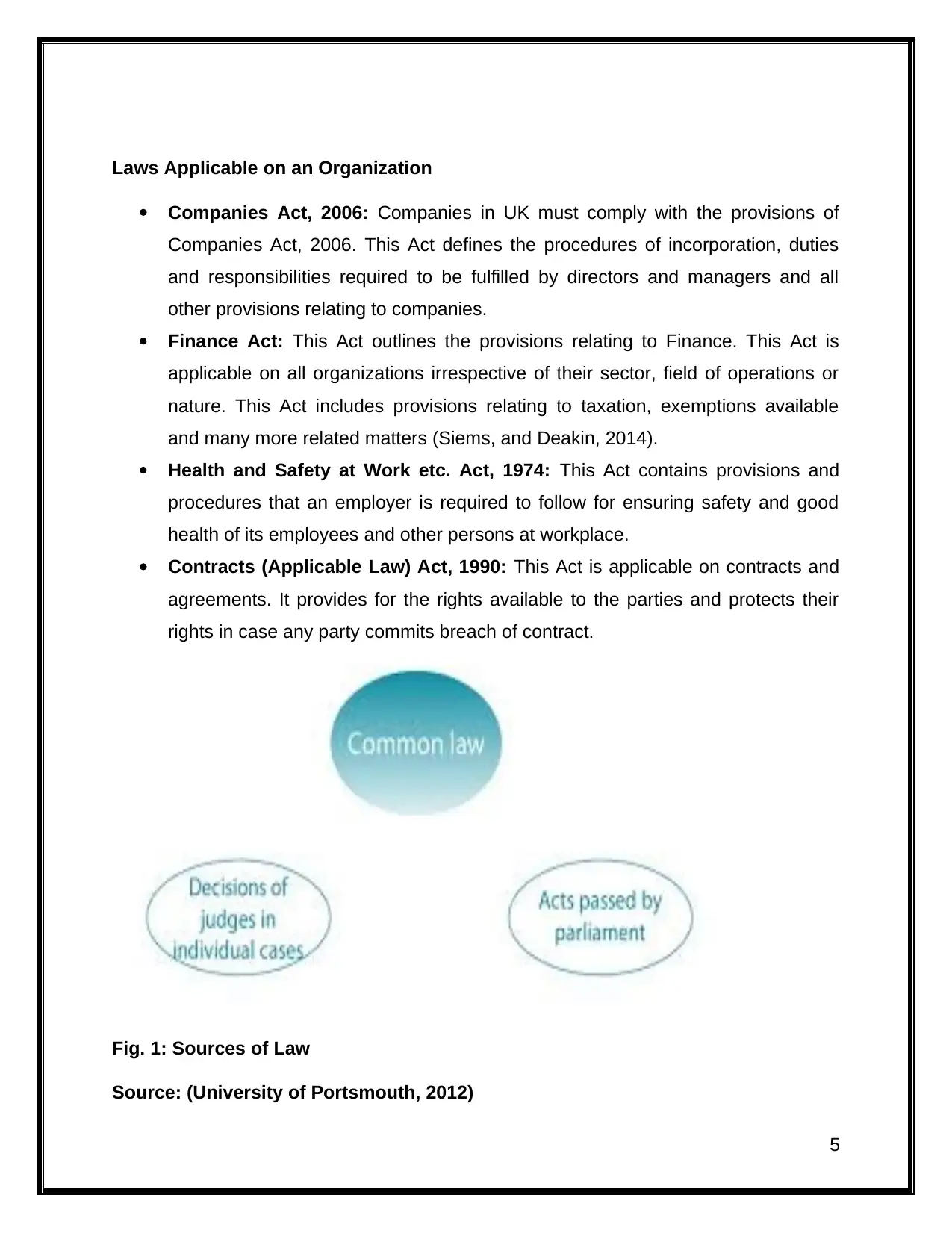
Laws Applicable on an Organization
Companies Act, 2006: Companies in UK must comply with the provisions of
Companies Act, 2006. This Act defines the procedures of incorporation, duties
and responsibilities required to be fulfilled by directors and managers and all
other provisions relating to companies.
Finance Act: This Act outlines the provisions relating to Finance. This Act is
applicable on all organizations irrespective of their sector, field of operations or
nature. This Act includes provisions relating to taxation, exemptions available
and many more related matters (Siems, and Deakin, 2014).
Health and Safety at Work etc. Act, 1974: This Act contains provisions and
procedures that an employer is required to follow for ensuring safety and good
health of its employees and other persons at workplace.
Contracts (Applicable Law) Act, 1990: This Act is applicable on contracts and
agreements. It provides for the rights available to the parties and protects their
rights in case any party commits breach of contract.
Fig. 1: Sources of Law
Source: (University of Portsmouth, 2012)
5
Companies Act, 2006: Companies in UK must comply with the provisions of
Companies Act, 2006. This Act defines the procedures of incorporation, duties
and responsibilities required to be fulfilled by directors and managers and all
other provisions relating to companies.
Finance Act: This Act outlines the provisions relating to Finance. This Act is
applicable on all organizations irrespective of their sector, field of operations or
nature. This Act includes provisions relating to taxation, exemptions available
and many more related matters (Siems, and Deakin, 2014).
Health and Safety at Work etc. Act, 1974: This Act contains provisions and
procedures that an employer is required to follow for ensuring safety and good
health of its employees and other persons at workplace.
Contracts (Applicable Law) Act, 1990: This Act is applicable on contracts and
agreements. It provides for the rights available to the parties and protects their
rights in case any party commits breach of contract.
Fig. 1: Sources of Law
Source: (University of Portsmouth, 2012)
5

6
⊘ This is a preview!⊘
Do you want full access?
Subscribe today to unlock all pages.

Trusted by 1+ million students worldwide
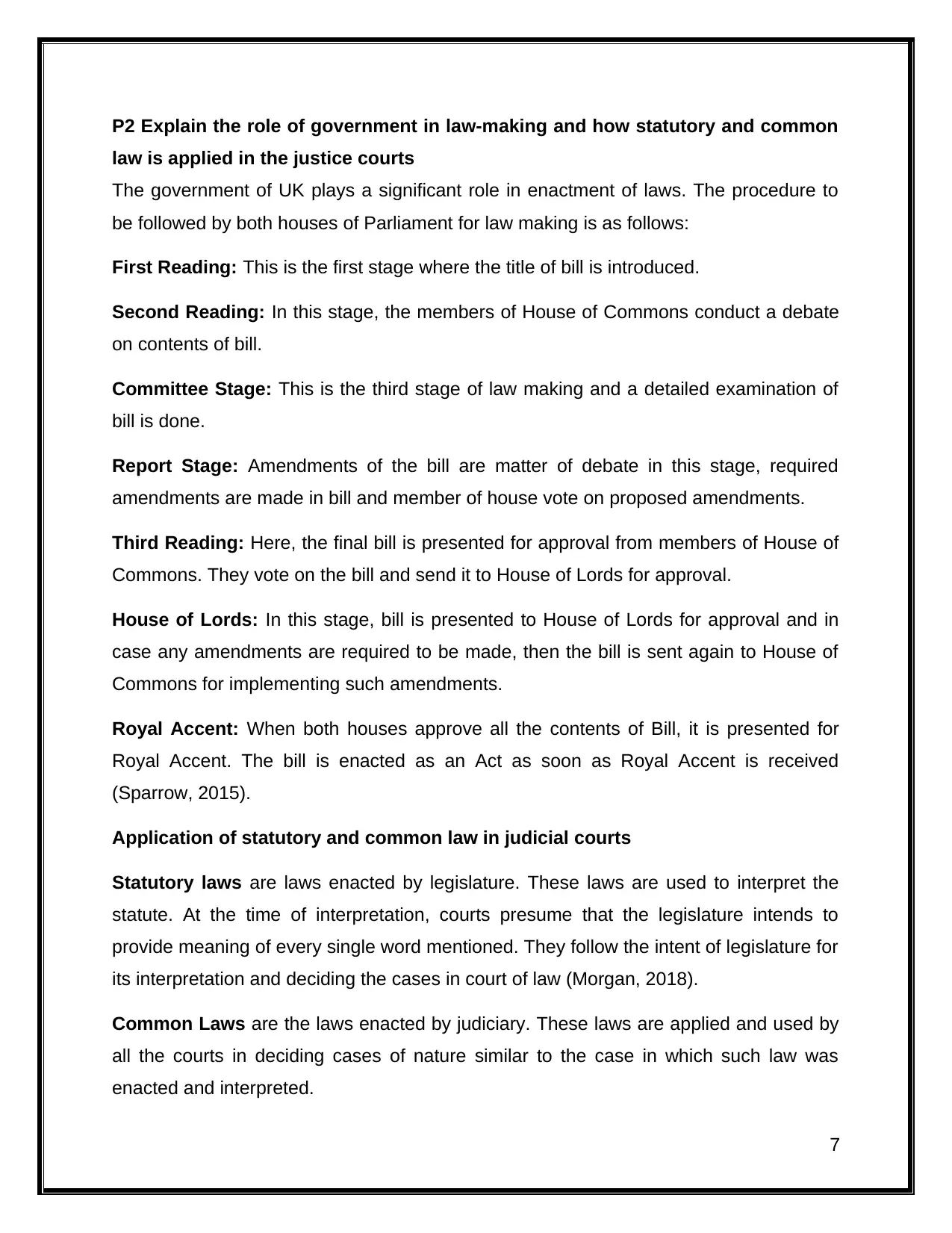
P2 Explain the role of government in law-making and how statutory and common
law is applied in the justice courts
The government of UK plays a significant role in enactment of laws. The procedure to
be followed by both houses of Parliament for law making is as follows:
First Reading: This is the first stage where the title of bill is introduced.
Second Reading: In this stage, the members of House of Commons conduct a debate
on contents of bill.
Committee Stage: This is the third stage of law making and a detailed examination of
bill is done.
Report Stage: Amendments of the bill are matter of debate in this stage, required
amendments are made in bill and member of house vote on proposed amendments.
Third Reading: Here, the final bill is presented for approval from members of House of
Commons. They vote on the bill and send it to House of Lords for approval.
House of Lords: In this stage, bill is presented to House of Lords for approval and in
case any amendments are required to be made, then the bill is sent again to House of
Commons for implementing such amendments.
Royal Accent: When both houses approve all the contents of Bill, it is presented for
Royal Accent. The bill is enacted as an Act as soon as Royal Accent is received
(Sparrow, 2015).
Application of statutory and common law in judicial courts
Statutory laws are laws enacted by legislature. These laws are used to interpret the
statute. At the time of interpretation, courts presume that the legislature intends to
provide meaning of every single word mentioned. They follow the intent of legislature for
its interpretation and deciding the cases in court of law (Morgan, 2018).
Common Laws are the laws enacted by judiciary. These laws are applied and used by
all the courts in deciding cases of nature similar to the case in which such law was
enacted and interpreted.
7
law is applied in the justice courts
The government of UK plays a significant role in enactment of laws. The procedure to
be followed by both houses of Parliament for law making is as follows:
First Reading: This is the first stage where the title of bill is introduced.
Second Reading: In this stage, the members of House of Commons conduct a debate
on contents of bill.
Committee Stage: This is the third stage of law making and a detailed examination of
bill is done.
Report Stage: Amendments of the bill are matter of debate in this stage, required
amendments are made in bill and member of house vote on proposed amendments.
Third Reading: Here, the final bill is presented for approval from members of House of
Commons. They vote on the bill and send it to House of Lords for approval.
House of Lords: In this stage, bill is presented to House of Lords for approval and in
case any amendments are required to be made, then the bill is sent again to House of
Commons for implementing such amendments.
Royal Accent: When both houses approve all the contents of Bill, it is presented for
Royal Accent. The bill is enacted as an Act as soon as Royal Accent is received
(Sparrow, 2015).
Application of statutory and common law in judicial courts
Statutory laws are laws enacted by legislature. These laws are used to interpret the
statute. At the time of interpretation, courts presume that the legislature intends to
provide meaning of every single word mentioned. They follow the intent of legislature for
its interpretation and deciding the cases in court of law (Morgan, 2018).
Common Laws are the laws enacted by judiciary. These laws are applied and used by
all the courts in deciding cases of nature similar to the case in which such law was
enacted and interpreted.
7
Paraphrase This Document
Need a fresh take? Get an instant paraphrase of this document with our AI Paraphraser
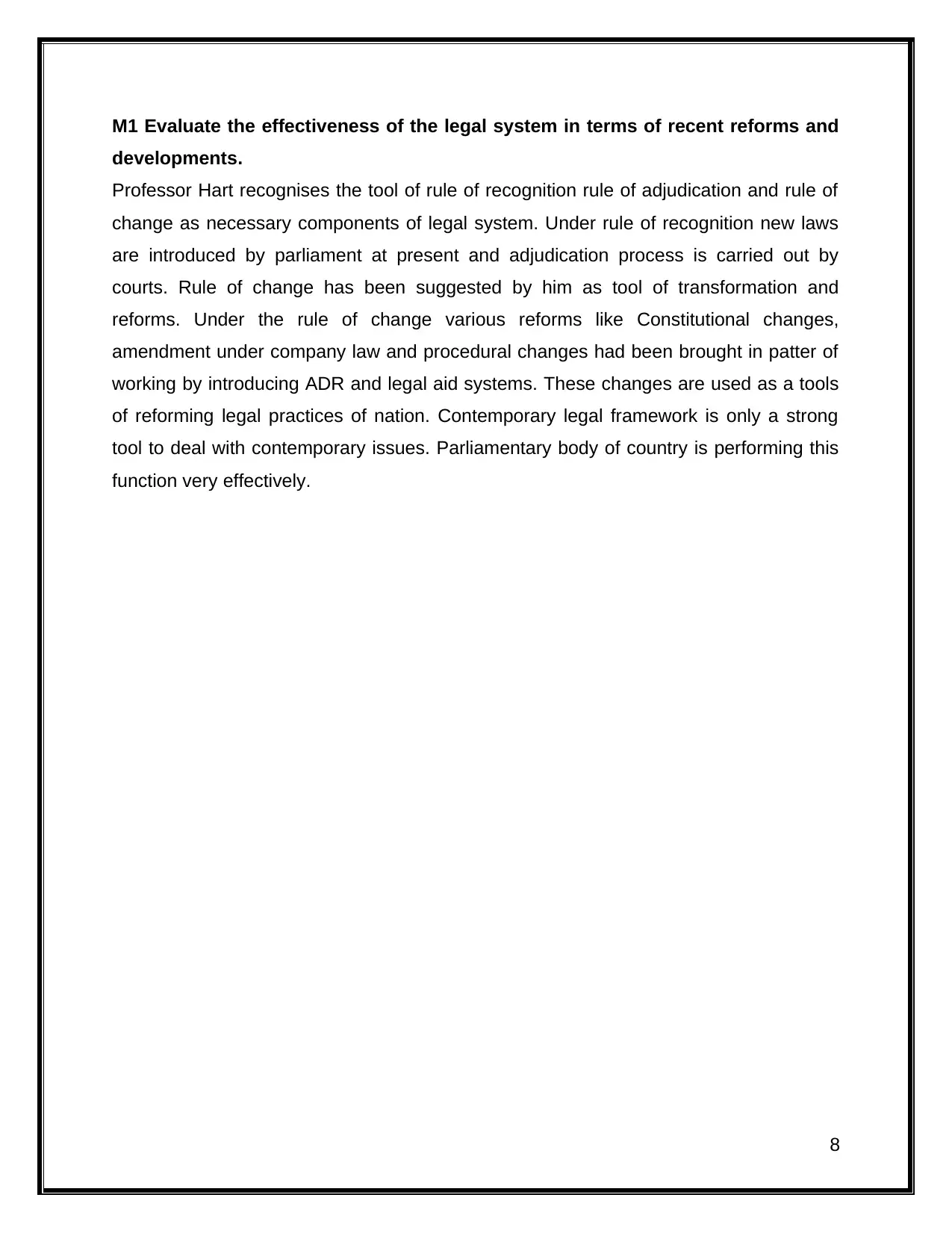
M1 Evaluate the effectiveness of the legal system in terms of recent reforms and
developments.
Professor Hart recognises the tool of rule of recognition rule of adjudication and rule of
change as necessary components of legal system. Under rule of recognition new laws
are introduced by parliament at present and adjudication process is carried out by
courts. Rule of change has been suggested by him as tool of transformation and
reforms. Under the rule of change various reforms like Constitutional changes,
amendment under company law and procedural changes had been brought in patter of
working by introducing ADR and legal aid systems. These changes are used as a tools
of reforming legal practices of nation. Contemporary legal framework is only a strong
tool to deal with contemporary issues. Parliamentary body of country is performing this
function very effectively.
8
developments.
Professor Hart recognises the tool of rule of recognition rule of adjudication and rule of
change as necessary components of legal system. Under rule of recognition new laws
are introduced by parliament at present and adjudication process is carried out by
courts. Rule of change has been suggested by him as tool of transformation and
reforms. Under the rule of change various reforms like Constitutional changes,
amendment under company law and procedural changes had been brought in patter of
working by introducing ADR and legal aid systems. These changes are used as a tools
of reforming legal practices of nation. Contemporary legal framework is only a strong
tool to deal with contemporary issues. Parliamentary body of country is performing this
function very effectively.
8
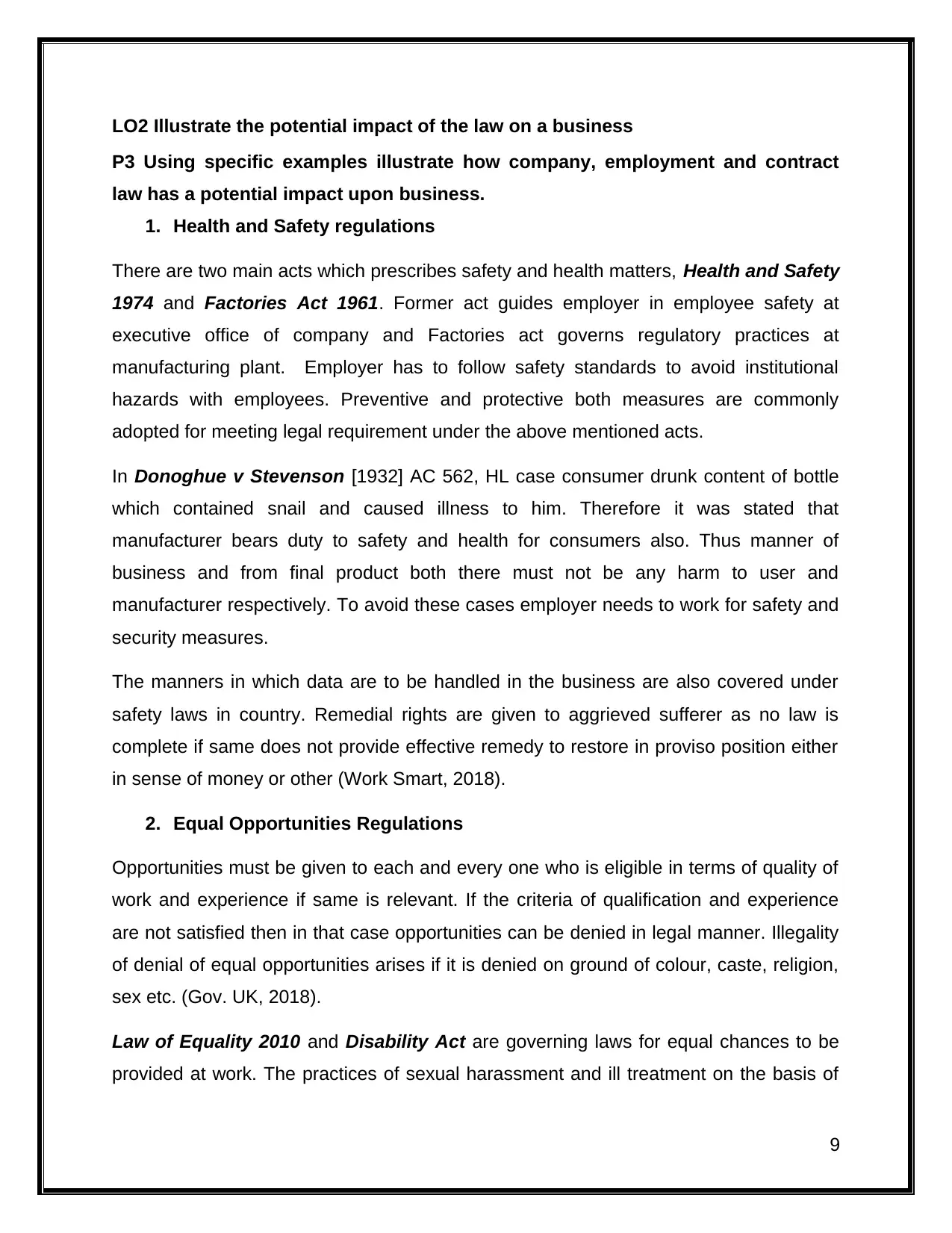
LO2 Illustrate the potential impact of the law on a business
P3 Using specific examples illustrate how company, employment and contract
law has a potential impact upon business.
1. Health and Safety regulations
There are two main acts which prescribes safety and health matters, Health and Safety
1974 and Factories Act 1961. Former act guides employer in employee safety at
executive office of company and Factories act governs regulatory practices at
manufacturing plant. Employer has to follow safety standards to avoid institutional
hazards with employees. Preventive and protective both measures are commonly
adopted for meeting legal requirement under the above mentioned acts.
In Donoghue v Stevenson [1932] AC 562, HL case consumer drunk content of bottle
which contained snail and caused illness to him. Therefore it was stated that
manufacturer bears duty to safety and health for consumers also. Thus manner of
business and from final product both there must not be any harm to user and
manufacturer respectively. To avoid these cases employer needs to work for safety and
security measures.
The manners in which data are to be handled in the business are also covered under
safety laws in country. Remedial rights are given to aggrieved sufferer as no law is
complete if same does not provide effective remedy to restore in proviso position either
in sense of money or other (Work Smart, 2018).
2. Equal Opportunities Regulations
Opportunities must be given to each and every one who is eligible in terms of quality of
work and experience if same is relevant. If the criteria of qualification and experience
are not satisfied then in that case opportunities can be denied in legal manner. Illegality
of denial of equal opportunities arises if it is denied on ground of colour, caste, religion,
sex etc. (Gov. UK, 2018).
Law of Equality 2010 and Disability Act are governing laws for equal chances to be
provided at work. The practices of sexual harassment and ill treatment on the basis of
9
P3 Using specific examples illustrate how company, employment and contract
law has a potential impact upon business.
1. Health and Safety regulations
There are two main acts which prescribes safety and health matters, Health and Safety
1974 and Factories Act 1961. Former act guides employer in employee safety at
executive office of company and Factories act governs regulatory practices at
manufacturing plant. Employer has to follow safety standards to avoid institutional
hazards with employees. Preventive and protective both measures are commonly
adopted for meeting legal requirement under the above mentioned acts.
In Donoghue v Stevenson [1932] AC 562, HL case consumer drunk content of bottle
which contained snail and caused illness to him. Therefore it was stated that
manufacturer bears duty to safety and health for consumers also. Thus manner of
business and from final product both there must not be any harm to user and
manufacturer respectively. To avoid these cases employer needs to work for safety and
security measures.
The manners in which data are to be handled in the business are also covered under
safety laws in country. Remedial rights are given to aggrieved sufferer as no law is
complete if same does not provide effective remedy to restore in proviso position either
in sense of money or other (Work Smart, 2018).
2. Equal Opportunities Regulations
Opportunities must be given to each and every one who is eligible in terms of quality of
work and experience if same is relevant. If the criteria of qualification and experience
are not satisfied then in that case opportunities can be denied in legal manner. Illegality
of denial of equal opportunities arises if it is denied on ground of colour, caste, religion,
sex etc. (Gov. UK, 2018).
Law of Equality 2010 and Disability Act are governing laws for equal chances to be
provided at work. The practices of sexual harassment and ill treatment on the basis of
9
⊘ This is a preview!⊘
Do you want full access?
Subscribe today to unlock all pages.

Trusted by 1+ million students worldwide
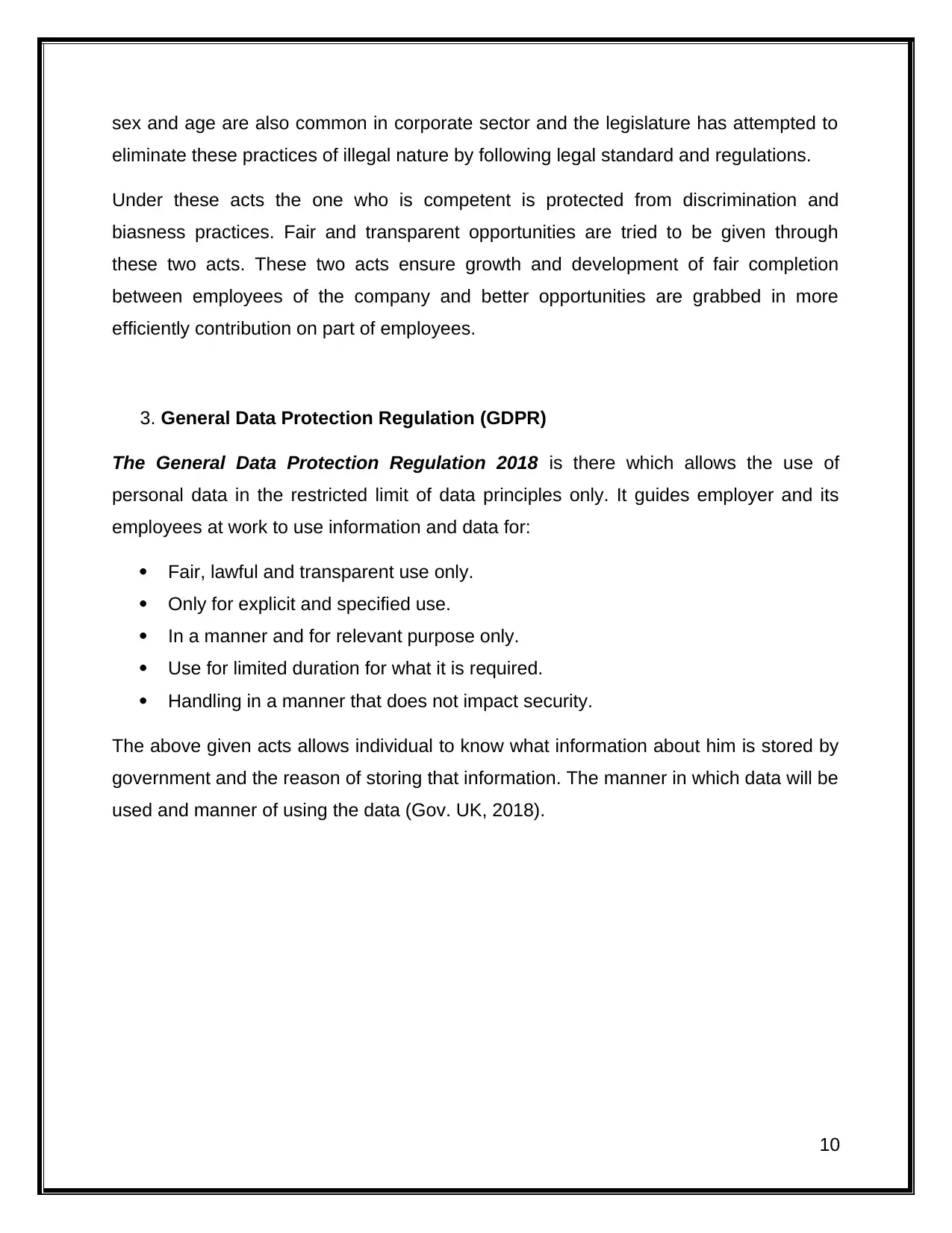
sex and age are also common in corporate sector and the legislature has attempted to
eliminate these practices of illegal nature by following legal standard and regulations.
Under these acts the one who is competent is protected from discrimination and
biasness practices. Fair and transparent opportunities are tried to be given through
these two acts. These two acts ensure growth and development of fair completion
between employees of the company and better opportunities are grabbed in more
efficiently contribution on part of employees.
3. General Data Protection Regulation (GDPR)
The General Data Protection Regulation 2018 is there which allows the use of
personal data in the restricted limit of data principles only. It guides employer and its
employees at work to use information and data for:
Fair, lawful and transparent use only.
Only for explicit and specified use.
In a manner and for relevant purpose only.
Use for limited duration for what it is required.
Handling in a manner that does not impact security.
The above given acts allows individual to know what information about him is stored by
government and the reason of storing that information. The manner in which data will be
used and manner of using the data (Gov. UK, 2018).
10
eliminate these practices of illegal nature by following legal standard and regulations.
Under these acts the one who is competent is protected from discrimination and
biasness practices. Fair and transparent opportunities are tried to be given through
these two acts. These two acts ensure growth and development of fair completion
between employees of the company and better opportunities are grabbed in more
efficiently contribution on part of employees.
3. General Data Protection Regulation (GDPR)
The General Data Protection Regulation 2018 is there which allows the use of
personal data in the restricted limit of data principles only. It guides employer and its
employees at work to use information and data for:
Fair, lawful and transparent use only.
Only for explicit and specified use.
In a manner and for relevant purpose only.
Use for limited duration for what it is required.
Handling in a manner that does not impact security.
The above given acts allows individual to know what information about him is stored by
government and the reason of storing that information. The manner in which data will be
used and manner of using the data (Gov. UK, 2018).
10
Paraphrase This Document
Need a fresh take? Get an instant paraphrase of this document with our AI Paraphraser
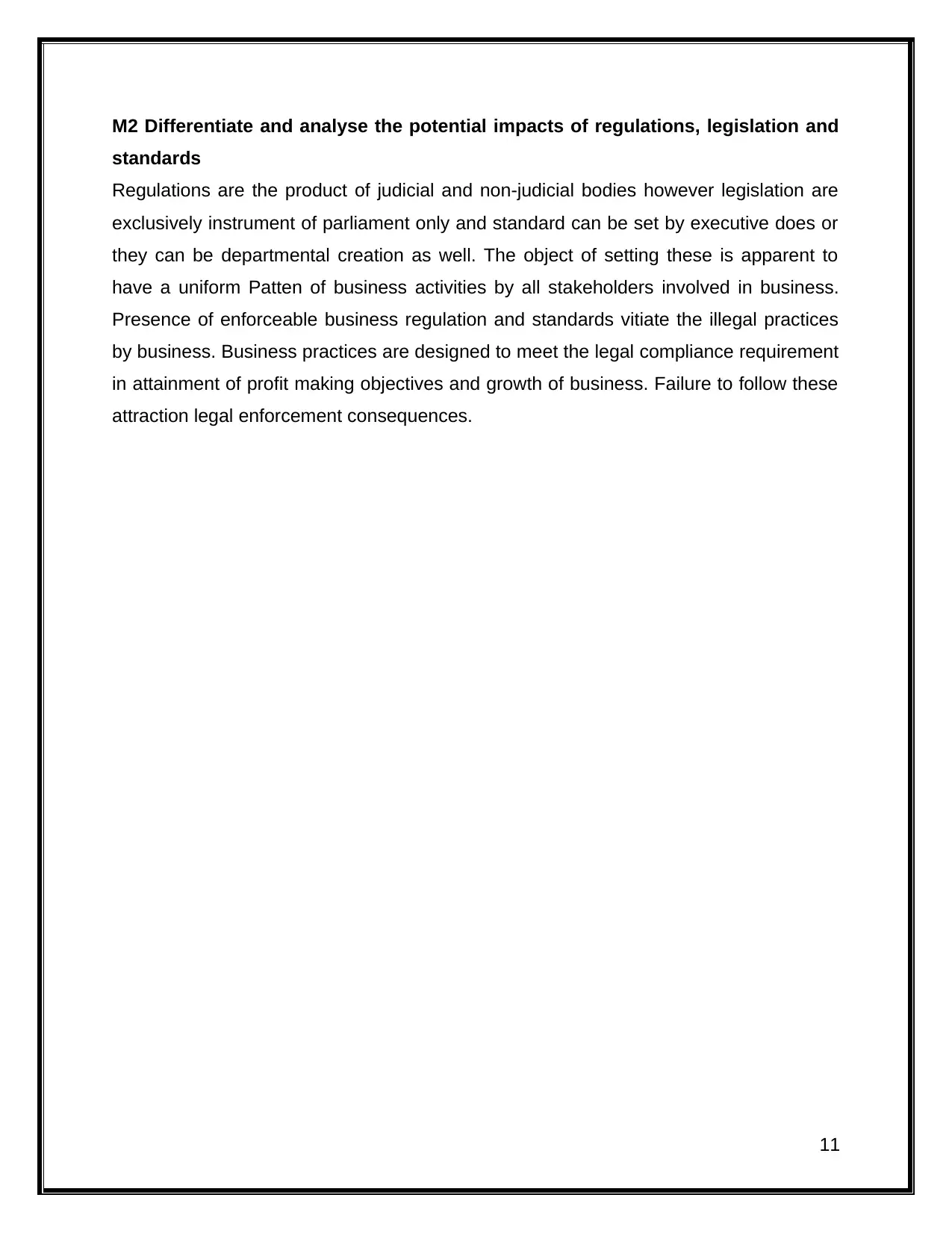
M2 Differentiate and analyse the potential impacts of regulations, legislation and
standards
Regulations are the product of judicial and non-judicial bodies however legislation are
exclusively instrument of parliament only and standard can be set by executive does or
they can be departmental creation as well. The object of setting these is apparent to
have a uniform Patten of business activities by all stakeholders involved in business.
Presence of enforceable business regulation and standards vitiate the illegal practices
by business. Business practices are designed to meet the legal compliance requirement
in attainment of profit making objectives and growth of business. Failure to follow these
attraction legal enforcement consequences.
11
standards
Regulations are the product of judicial and non-judicial bodies however legislation are
exclusively instrument of parliament only and standard can be set by executive does or
they can be departmental creation as well. The object of setting these is apparent to
have a uniform Patten of business activities by all stakeholders involved in business.
Presence of enforceable business regulation and standards vitiate the illegal practices
by business. Business practices are designed to meet the legal compliance requirement
in attainment of profit making objectives and growth of business. Failure to follow these
attraction legal enforcement consequences.
11
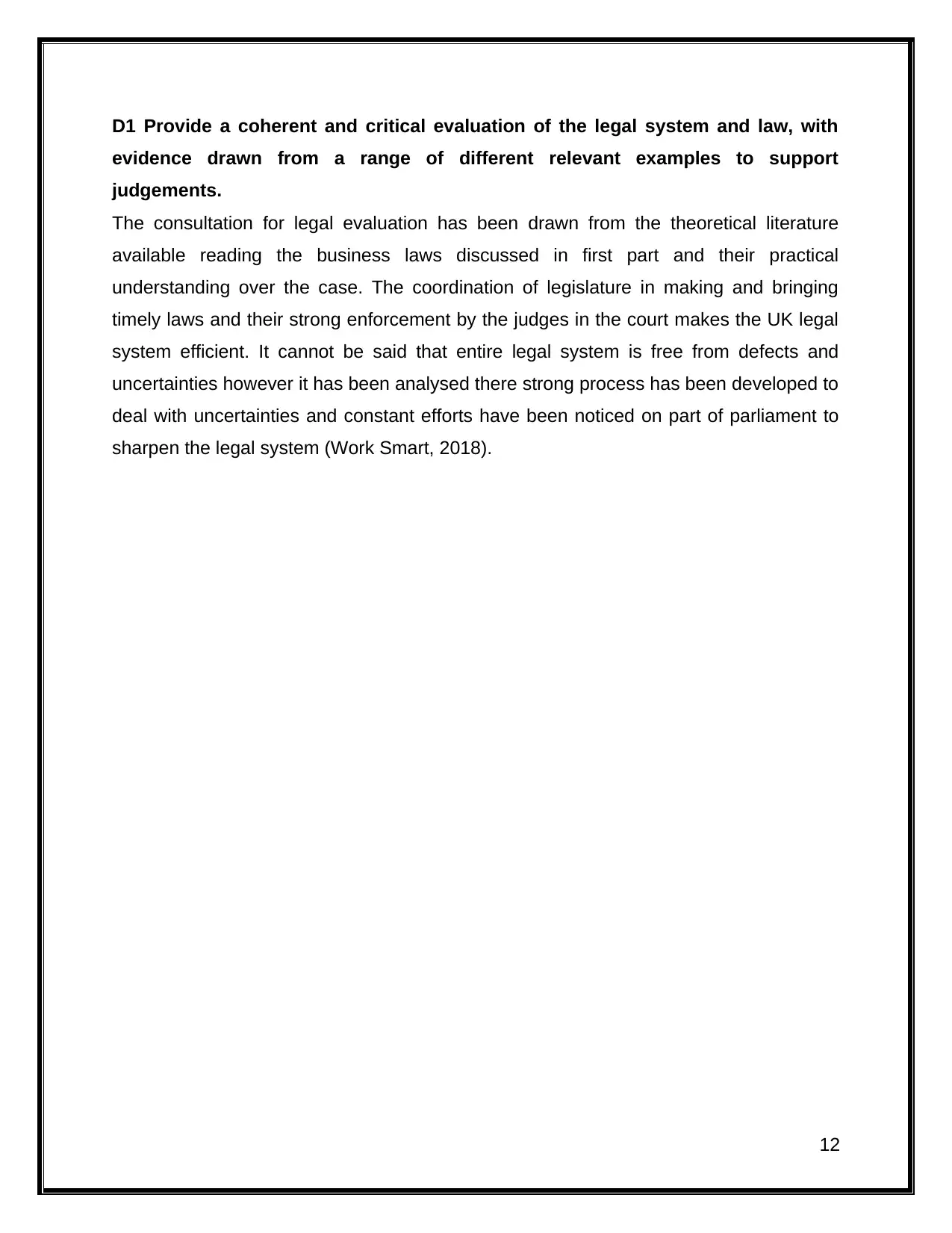
D1 Provide a coherent and critical evaluation of the legal system and law, with
evidence drawn from a range of different relevant examples to support
judgements.
The consultation for legal evaluation has been drawn from the theoretical literature
available reading the business laws discussed in first part and their practical
understanding over the case. The coordination of legislature in making and bringing
timely laws and their strong enforcement by the judges in the court makes the UK legal
system efficient. It cannot be said that entire legal system is free from defects and
uncertainties however it has been analysed there strong process has been developed to
deal with uncertainties and constant efforts have been noticed on part of parliament to
sharpen the legal system (Work Smart, 2018).
12
evidence drawn from a range of different relevant examples to support
judgements.
The consultation for legal evaluation has been drawn from the theoretical literature
available reading the business laws discussed in first part and their practical
understanding over the case. The coordination of legislature in making and bringing
timely laws and their strong enforcement by the judges in the court makes the UK legal
system efficient. It cannot be said that entire legal system is free from defects and
uncertainties however it has been analysed there strong process has been developed to
deal with uncertainties and constant efforts have been noticed on part of parliament to
sharpen the legal system (Work Smart, 2018).
12
⊘ This is a preview!⊘
Do you want full access?
Subscribe today to unlock all pages.

Trusted by 1+ million students worldwide
1 out of 23
Related Documents
Your All-in-One AI-Powered Toolkit for Academic Success.
+13062052269
info@desklib.com
Available 24*7 on WhatsApp / Email
![[object Object]](/_next/static/media/star-bottom.7253800d.svg)
Unlock your academic potential
Copyright © 2020–2026 A2Z Services. All Rights Reserved. Developed and managed by ZUCOL.





